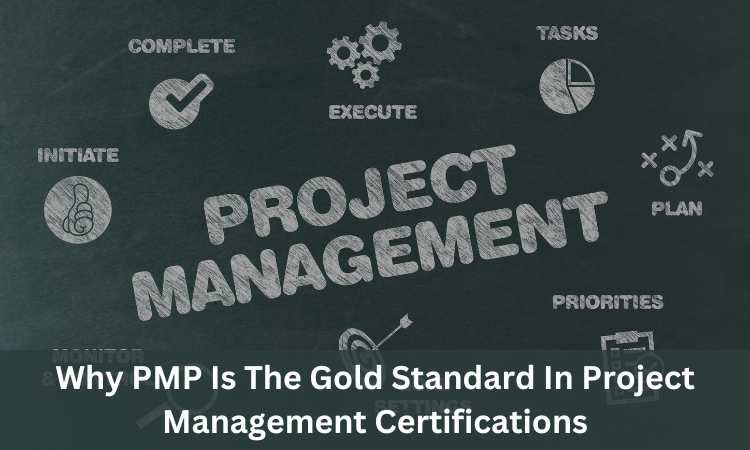1. Global Recognition and Prestige
One of the most compelling reasons PMP is considered the gold standard is its global recognition. With over a million PMP-certified professionals worldwide, the certification is universally respected. Whether you’re working in IT, construction, healthcare, or any other industry, PMP is recognized as a mark of excellence in project management.
Why Global Recognition Matters
- Opens Doors Worldwide: PMP-certified professionals are in demand globally, making it easier to pursue job opportunities across different countries.
- Consistency Across Industries: The PMP framework provides a standardized approach to project management, ensuring that certified professionals can effectively lead projects in any industry or region.
- Prestige and Credibility: Being PMP-certified instantly boosts your credibility, as employers and clients associate the credential with top-tier project management skills.
This worldwide prestige makes PMP a powerful tool for those seeking to advance their careers on a global scale.
2. Comprehensive Knowledge and Skills
The PMP certification covers a broad spectrum of project management concepts, tools, and techniques. The Project Management Institute (PMI) updates the PMP curriculum regularly to ensure that it stays aligned with the latest industry trends and best practices. This comprehensive coverage ensures that PMP-certified professionals are well-equipped to handle the complexities of modern projects.
Core Areas Covered by PMP
- Initiating and Planning: PMP emphasizes strategic planning and the importance of defining clear objectives and goals at the outset of any project.
- Execution and Monitoring: You’ll learn how to manage teams, allocate resources, track progress, and ensure that project deliverables are met.
- Risk Management: PMP training includes identifying potential risks, evaluating their impact, and devising contingency plans to mitigate those risks.
- Closing Projects: Effective project closure is critical for ensuring that all objectives are met, and lessons are documented for future improvement.
The rigorous content ensures that PMP-certified professionals are proficient in both the technical and interpersonal aspects of project management, allowing them to lead projects with confidence and precision.
3. Enhances Earning Potential
For many professionals, one of the main motivations for obtaining PMP certification is the significant impact it can have on earning potential. Numerous studies and salary surveys have shown that PMP-certified professionals earn higher salaries compared to their non-certified peers.
How PMP Boosts Your Salary
- Market Demand: The demand for PMP-certified project managers continues to rise, as organizations value the structured, efficient approach that PMP-certified individuals bring to projects.
- Proven Expertise: Employers are willing to offer higher salaries to professionals who have proven their expertise by passing the challenging PMP exam.
- Career Advancement: PMP certification opens up new career opportunities, including senior project management positions, which typically come with higher compensation.
According to PMI’s Salary Survey, PMP-certified project managers in the U.S. report earning up to 25% more than those without the certification. This financial benefit makes the investment in PMP certification well worth the effort.
4. Focus on Leadership and Team Management
Effective project management requires more than just technical skills; it also demands strong leadership and team management abilities. PMP certification not only teaches you how to manage projects but also how to lead people. The soft skills covered in PMP training, such as communication, conflict resolution, and leadership, are crucial for building and managing high-performing teams.
Leadership Skills Taught in PMP
- Effective Communication: PMP emphasizes the importance of clear, concise communication to ensure that all stakeholders are aligned with the project’s goals.
- Team Motivation and Conflict Management: As a project leader, you’ll learn techniques to keep your team motivated and handle conflicts that arise during project execution.
- Stakeholder Management: PMP helps you develop the skills to manage stakeholders’ expectations, ensuring that the project stays on track and meets its objectives.
By focusing on leadership and interpersonal skills, PMP prepares you to not only manage projects but to inspire and guide your teams toward success.
5. Adaptability to Various Project Management Approaches
The field of project management has seen the emergence of various methodologies, such as Agile, Scrum, and Waterfall, each suited to different types of projects. The PMP certification is flexible and adaptable, providing professionals with the knowledge needed to apply the most appropriate project management methodologies to their specific projects.
PMP and Methodology Versatility
- Traditional (Waterfall) Projects: PMP provides in-depth training on traditional project management methods, making it ideal for projects with defined stages and deliverables.
- Agile and Hybrid Projects: The PMP exam has integrated Agile and hybrid methodologies, preparing certified professionals to manage projects in dynamic and flexible environments.
- Tailoring Approaches: PMP-certified project managers are trained to assess the project’s nature and select the methodology that will best ensure success.
This versatility ensures that PMP-certified professionals can manage projects across industries and sectors, regardless of the methodology in use.
6. A Commitment to Continuous Improvement
PMP certification is not a one-time achievement; it requires a commitment to continuous learning and improvement. To maintain the certification, professionals must earn Professional Development Units (PDUs) by attending workshops, completing courses, or participating in relevant industry activities. This ensures that PMP-certified individuals stay up-to-date with the latest trends and practices in project management.
Why Continuous Learning Matters
- Keeps Skills Relevant: The project management field is constantly evolving, and maintaining PMP certification ensures that your skills stay current.
- Encourages Lifelong Learning: By regularly engaging in professional development, PMP-certified individuals demonstrate their commitment to growth and improvement.
- Adaptability to Change: The continuous learning process helps you stay agile and adaptable in a rapidly changing business environment.
This ongoing requirement for professional development ensures that PMP-certified project managers are always at the forefront of industry best practices.

